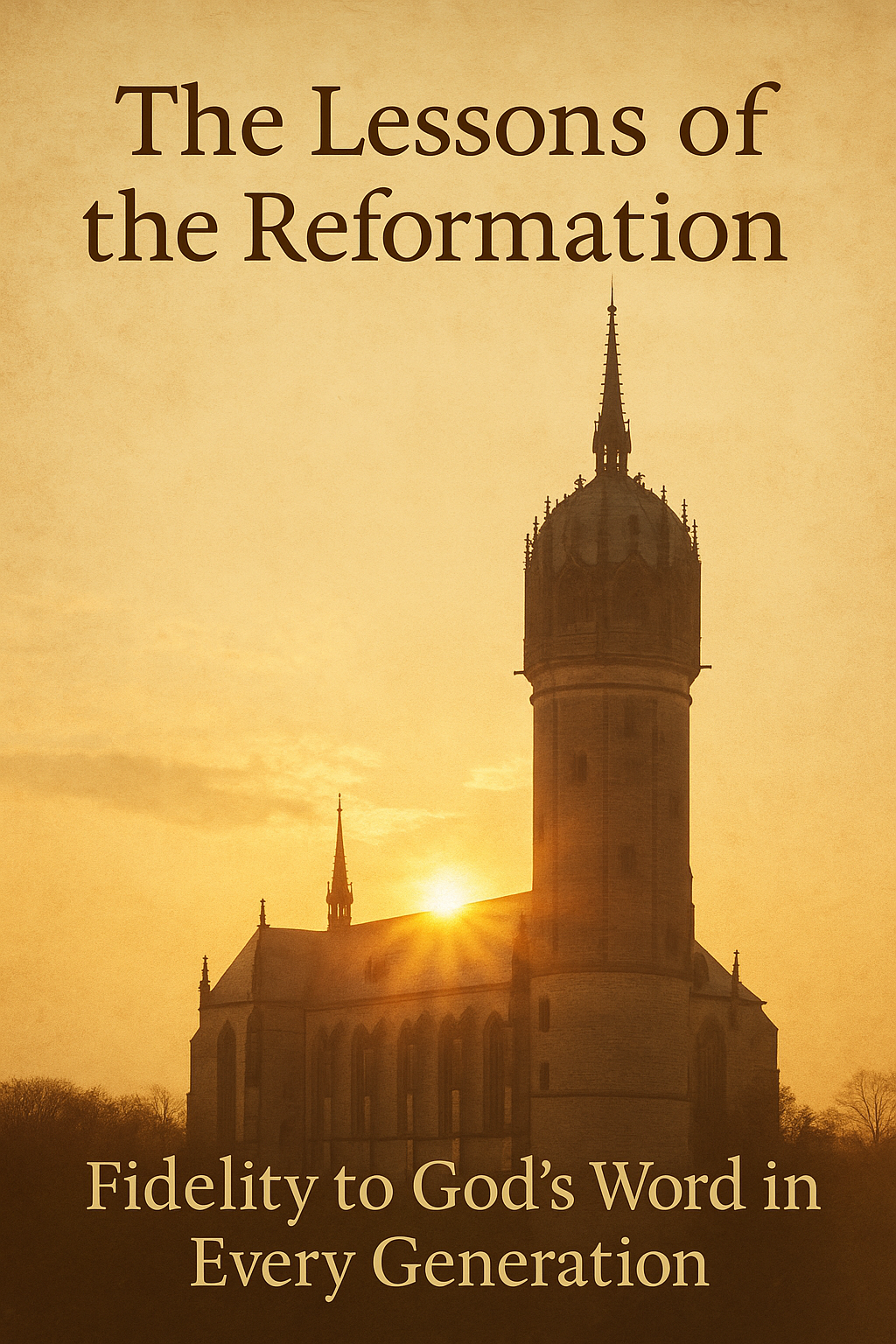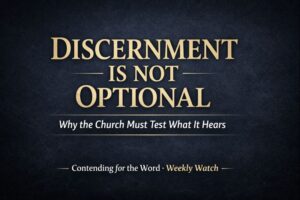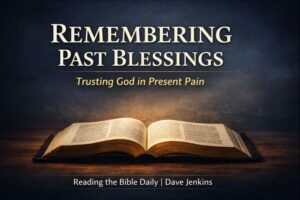⏱️ Estimated Reading Time: 8 min read
Editor’s Note: This article by Stephen J. Nichols appears in our October 2025 series, Always Reforming: Fidelity to God’s Word in Every Generation, reflecting on the enduring lessons of the Reformation for the church today.
The Lessons of the Reformation
The things that matter most to us all center on the gospel. The church simply cannot afford to forget the lesson of the Reformation about the utter supremacy of the gospel in everything the church does.
Elie Wiesel, Nobel Prize winner and Holocaust survivor, dedicated his life to bearing witness to the unimaginable horrors of the Holocaust. He speaks of the unspeakable so that humanity will not forget. It is far too easy to forget, especially when forgetting eases our conscience.
History compels us to remember. In studying the Reformation, we remember what the church is all about, and we remember how easy it is for the church to lose its grip on the gospel.
If he said it once, Martin Luther said it a hundred times: “The church’s true treasure is the gospel.” Luther lived at a time when this true treasure had been traded for something worth far less.
As a monk, he stood in a long line of theologians and churchmen who had heaped up layer upon layer of extrabiblical teaching and practice, obscuring the church’s true treasure. Like scaffolding that hides the beauty of a building, these layers needed to be torn down so what mattered could be seen without obstruction.
Luther, with help from his friends, tore down the scaffolding and revealed the beauty and wonder of the gospel once again. He called his own (re)discovery of the gospel a “breakthrough” (Durchbruch in German).
The 5 Solas of the Reformation
In the process, the Reformers brought about a revolution of church life, practice, and doctrine. Many doctrines Protestants take for granted today find their clearest expression in their work. Theologians speak of the solas—from the Latin sola, meaning “alone.” Usually we list five:
- Sola Scriptura — “Scripture alone”: The Bible is the sole and final authority in all matters of life and godliness. The church looks to the Bible as its ultimate authority.
- Sola Gratia and Sola Fide — “grace alone” and “faith alone”: Salvation is by grace alone through faith alone. It is not by works; we come to Christ empty-handed. This is the great doctrine of justification by faith alone, the cornerstone of the Reformation.
- Solus Christus — “Christ alone”: There is no other mediator between God and sinful humanity than Christ. He alone, on the basis of his work on the cross, grants access to the Father.
- Soli Deo Gloria — “the glory of God alone”: All of life can be lived for the glory of God; everything we do can and should be done for his glory. The Reformers called this the doctrine of vocation, viewing our work and all our roles as a calling.
These doctrines form the bedrock of our belief, and the Reformers gave them their finest expression. They also recovered practices we now take for granted. The church had lost sight of the sermon, celebrating the Mass instead. The Reformers returned the sermon to the center of worship. In England, the Puritans returned it with a vengeance.
Congregations had largely stopped singing in the centuries leading up to the Reformation. Jan Hus, a pre-Reformation reformer, was condemned in part for leading congregational song. Luther and the other Reformers restored congregational singing to the church, echoing the biblical pattern of believers singing the Word to one another (Colossians 3:16; Ephesians 5:19). Knowing this should humble us every time we sing, and it should remind us of what Hus gave for that privilege.
The Reformers also revolutionized daily life outside the church. They gave new meaning to work and to various roles—spouses, parents, and children; employees and employers; civic rulers and citizens. Before the Reformation, the only work that really mattered was church work. The rest of life was often viewed as merely putting in time.
Do We Still Need the Reformation?
So far we have assumed that the Reformation matters because it served the church at a time when many had lost their way. Some, however, have a different opinion of its value.
Mark Noll, the dean of American church historians, coauthored a book with the provocative title, Is the Reformation Over? Noll and Carolyn Nystrom answer in the affirmative, and their view has been hotly debated. This perspective stretches back to the document “Evangelicals and Catholics Together” (ECT), which speaks of a newfound unity between Roman Catholics and evangelicals “nearly five hundred years after the divisions of the Reformation era.”
This approach sees the Reformation as a necessary corrective for a medieval Roman Catholic church adrift from the gospel and the authority of Scripture, but argues that times have changed. Consequently, the Reformation is over, and we should now seek unity that bridges the Protestant–Roman Catholic divide.
In other circles, such as recent movements within the Anglican Church, the Reformation is viewed negatively—as the source of division and strife, a failure to live up to Christ’s command that the church be one (John 17:23).
Luther and the other Reformers championed unity, but not unity at all costs. The ecumenical spirit of our age often neglects their caution, pursuing a unity built on flimsy theological foundations. Against the current drive for ecumenism—and even pluralism—the Reformers remind us that unity apart from a solid biblical and theological base builds a grand castle on sand.
Others within evangelicalism look askance at the Reformation for causing too many divisions and denominations. They seek unity within Protestantism and regard the Reformers as theological nitpickers concerned with minutiae. They cringe at the denominational landscape and cry out for unity.
What Was at Stake
Against these challenges, we must realize that the Reformers saw nothing less than the gospel at stake. We sometimes forget what Luther, Calvin, Zwingli, and others risked when they took a stand. They risked their very lives.
To regard their work as merely sowing the seeds of unfortunate division shows little knowledge of and little respect for what they did. They were human and had faults and shortcomings. They sinned—sometimes greatly. Yet, like the imperfect characters of Scripture, they were used greatly by God.
In other words, the church should be grateful for the Reformation. In an age of religious pluralism, theological laxity, and biblical illiteracy, perhaps the Reformation is needed more than ever.
Prior to the Reformation, various attempts at reform addressed leadership, wealth, and spirituality. These movements identified real problems but could not arrive at a lasting solution. They failed where the Reformation succeeded because the Reformers went to the heart of the matter: right theology.
The Reformers rightly diagnosed the disease and administered the cure. Today we can fall into the same trap as earlier attempts at reform, trusting programs, methods, or moral renewal. The Reformation sounds a clarion call of caution: if we do not get the doctrines of the Bible, Christ, and salvation right, we will never head in the right direction, no matter how innovative or zealous we may be.
Learning from the Reformation
We study the Reformation because of what we can learn. We learn of the treasure of the gospel and how easily the church can lose sight of its value. We learn the origins of practices we take for granted. We learn which doctrines matter most and how to proclaim them in our own time.
And we learn about real people—gifted and talented—who also possessed true human limitations. Above all, they point us beyond themselves to the God-man, Jesus Christ. Luther said it best: “We are beggars.”
Notes & Sources
- Mark A. Noll and Carolyn Nystrom, Is the Reformation Over? An Evangelical Assessment of Contemporary Roman Catholicism (Baker Academic, 2005).
- “Evangelicals and Catholics Together,” First Things 43 (May 1994), 15–22.
- ARCIC documents (Eucharist and Authority statements) at www.prounione.urbe.it.
This article is adapted from The Reformation: How a Monk and a Mallet Changed the World by Stephen J. Nichols.
For more like this article please visit: Always Reforming: Fidelity to God’s Word in Every Generation or at our YouTube.




